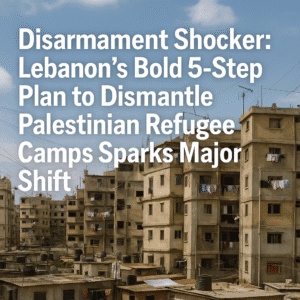Disarmament Shocker: Lebanon’s Bold 5-Step Plan to Dismantle Palestinian Refugee Camps Sparks Major Shift
Lebanon will begin disarming Palestinian refugee camps in June 2025 under a landmark agreement between Prime Minister Nawaf Salam and Palestinian Authority President Mahmoud Abbas, ending a decades-old hands-off approach. The initiative, starting with camps near Beirut, seeks to dismantle weapons caches controlled by factions like Hamas and Fatah, which have operated autonomously since Palestinian refugees settled in Lebanon after the 1948 Arab-Israeli war.
The move follows heightened tensions during the 2023–2024 Israel-Hezbollah conflict, where militants exploited camp territories for cross-border attacks. Lebanon’s army, emboldened by a 2024 ceasefire, recently seized hundreds of rockets from a northern camp and arrested militants, signaling renewed state control. The plan pairs disarmament with pledges to improve dire living conditions for 222,000 refugees, who face systemic discrimination and poverty. While the PA’s involvement lends legitimacy, challenges persist—armed groups may resist, and reconciling security goals with refugee rights remains delicate. The policy marks Lebanon’s boldest attempt to integrate camps into national governance, aiming to stabilize a volatile region long shaped by statelessness and militia influence.

Disarmament Shocker: Lebanon’s Bold 5-Step Plan to Dismantle Palestinian Refugee Camps Sparks Major Shift
In a significant policy reversal, Lebanon has announced plans to begin disarming Palestinian refugee camps starting in June 2025, following an agreement between Lebanese Prime Minister Nawaf Salam and Palestinian Authority (PA) President Mahmoud Abbas. The initiative, first targeting camps near Beirut, marks a departure from decades of non-intervention in these enclaves, where armed factions like Fatah and Hamas have traditionally managed security.
Breaking with Tradition
For over 70 years, Lebanese authorities have adhered to an unwritten rule barring military entry into the camps, established for Palestinians displaced during the 1948 Arab-Israeli war. Today, approximately 222,000 UNRWA-registered refugees reside in 12 overcrowded camps, facing systemic discrimination—including restrictions on employment and property ownership. The camps have also become hubs for armed groups, with Hamas reportedly launching attacks on Israel from Lebanese soil during the 2023–2024 Israel-Hezbollah conflict.
The Disarmament Plan
A joint Lebanese-Palestinian committee outlined a phased approach: weapons will be surrendered under a “specific timetable,” beginning with Beirut’s Burj al-Barajneh and other nearby camps. The plan also pledges to enhance refugees’ socio-economic rights, though details remain scarce. This dual strategy suggests Lebanon aims to address both security concerns and long-standing grievances among camp residents.
Context: Post-Ceasefire Security Push
The move follows Lebanon’s November 2024 ceasefire with Israel, which halted cross-border hostilities triggered by Hezbollah’s solidarity attacks with Hamas. Since then, the Lebanese army has intensified efforts to curb militant activity, seizing 800 rockets from the Al-Beddawi camp and arresting Palestinians involved in March 2025 rocket strikes. Disarming camps aligns with broader state initiatives to reclaim authority over all territories, particularly after Hezbollah’s diminished influence post-ceasefire.
Challenges and Implications
Success hinges on navigating complex dynamics. Armed factions may resist relinquishing weapons, risking internal clashes. Meanwhile, improving living conditions is critical—refugees’ marginalization has fueled resentment, making them susceptible to recruitment by militant groups. The PA’s involvement signals Abbas’s attempt to bolster relevance, though his limited control over groups like Hamas complicates enforcement.
Regionally, the disarmament could reduce cross-border tensions but may strain Lebanon’s ties with Iran-backed factions. For Israel, fewer attacks from Lebanon might ease security pressures, though skepticism persists given Hamas’s entrenched presence.
A Pivotal Moment
This policy shift represents Lebanon’s most assertive step toward integrating refugee camps into state governance. While risks of instability remain, the initiative underscores a recognition that lasting security requires addressing both arms and inequities. As June approaches, the world watches whether this bold experiment can transform one of the Middle East’s most enduring humanitarian and political challenges.
You must be logged in to post a comment.